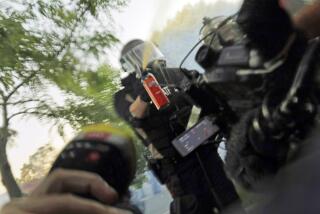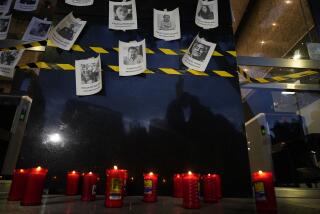Colombian Rebels Hold 2 Journalists
- Share via
BOGOTA, Colombia — A reporter and a photographer on assignment for the Los Angeles Times were being held prisoner in a lawless region in northeastern Colombia, leftist rebels said Thursday.
Scott Dalton, a photographer from Conroe, Texas, and Ruth Morris, who was born in England but grew up in the Los Angeles area, were being “retained” in Arauca province, according to an announcement on a local radio station operated by the National Liberation Army, or ELN.
The announcement came as three other U.S. journalists, two of them from California, were reportedly released by right-wing Colombian paramilitary members in northwestern Colombia after having been seized in a remote border region of Panama.
Although Colombian journalists are frequently targets of kidnappings and killings, foreign journalists are rarely singled out.”These people entered this zone without permission of the National Liberation Army, and for this reason, were retained at a control and registration roadblock of the National Liberation Army,” according to the statement.
“In the proper moment, they will be freed when the political and military conditions merit it.”
It was unclear when such conditions might exist; the Colombian army has been engaged in fierce combat in the region in recent days.About 70 U.S. Special Forces troops also recently arrived in the region along the Venezuelan border to begin training the local military unit to better protect an oil pipeline operated by Los Angeles-based Occidental Petroleum.
The pipeline is a frequent target in Colombia’s nearly 40-year-old civil war, which pits leftist rebels against the Colombian military and paramilitary groups, which form an illegal private army.
All of Colombia’s armed groups are currently involved in clashes in the region. Rebels from the ELN and the Revolutionary Armed Forces of Colombia, or FARC, are active there.
Morris and Dalton, though not members of The Times’ staff, were working as freelancers for the newspaper when they encountered a rebel roadblock Tuesday between the towns of Saravena and Tame, according to their driver, Madiel Ariza.
They inquired about the possibility of an interview but were told that they would have to accompany the rebels to a distant campsite. Morris resisted, then acquiesced after the rebels told her that she would be allowed to interview top commanders, Ariza said.
The three were led away. At one point, hoods were placed over their heads to conceal the route. Rebels have frequently required reporters to walk for several days to obtain interviews with elusive commanders.
The next day, Ariza was released with a message.
The guerrillas “told me it was not a kidnapping, that this was the routine and that they were taking advantage of the opportunity to send out a message to the international press,” Ariza said.
The two have not been heard from since Morris contacted this reporter Monday night.
The rebels accused the United States of declaring “war” on Arauca. However, the radio announcement indicated that Morris, a British citizen with U.S. residency, and Dalton, a U.S. citizen, would be protected.
“We are clearing up to national and international public opinion that we are ready to guarantee the life and safety of these journalists, and that it depends on the 18th Brigade,” the rebels said, referring to the local Colombian military unit.
Morris, 35, has reported for The Times for nearly four years. She has also worked for the Times of London, the BBC, the Florida Sun-Sentinel and Time magazine.
Dalton, 34, was a photographer for the Associated Press for nine years, working in Panama, Guatemala and Colombia, before leaving to work as a freelancer last year. He has worked for the New York Times and the Miami Herald before this assignment with The Times.
The Times said in a statement that it was working to obtain information about the journalists’ condition. “The situation in Colombia is very fluid, and our primary concern is for Ruth and Scott’s safety,” it said. The State Department and the Colombian government were working to determine where the two were.
“Obviously we are very concerned about the press reports. We’ll be doing everything we can,” said Gerry McLoughlin, the press attache for the U.S. Embassy in Bogota, the capital.
Colombian law prevents the military from taking action in kidnapping cases without the permission of family members, but it was unclear whether this restriction applied to foreigners living in Colombia.
More to Read
Sign up for Essential California
The most important California stories and recommendations in your inbox every morning.
You may occasionally receive promotional content from the Los Angeles Times.













